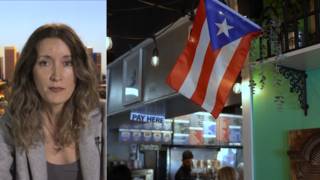
A mass protest is set for Puerto Rico on Thursday over the federal government’s unequal payments to the island’s Medicare and Medicaid programs. For decades, Congress has capped federal reimbursements of Puerto Rico’s healthcare costs, bringing the system to the brink of collapse. The Obama administration has warned Puerto Rico faces a humanitarian crisis unless Congress takes steps to address its crushing debt. We get analysis from Democracy Now! co-host and Daily News columnist Juan González.
Transcript
AMY GOODMAN: Juan, before we begin with the election results around the country, Puerto Rico is in the news with a major march going to be happening tomorrow.
JUAN GONZÁLEZ: Yes. I wrote a piece in the Daily News today, in my column, talking about this massive march that’s going to occur in Puerto Rico tomorrow, basically around the discriminatory practices of Medicaid and Medicare in its funding toward Puerto Rico. And what’s unusual is that both the governor of New York, Andrew Cuomo, and the mayor of New York, Bill de Blasio, will be going to San Juan tomorrow. They’ll be participating in the march. There’s also an annual conference of Latino elected officials in San Juan that they’re attending, but the idea that the mayor and the governor will be participating in a march against the federal government and its treatment of Puerto Rico is really unusual. The governor is also working with Puerto Rico to try to produce a Medicaid waiver that would allow at least a billion dollars more from the federal government to go to Puerto Rico.
But the reality is the health crisis in Puerto Rico is as severe, if not more severe, than the debt crisis, with over 300 doctors fleeing the island last year, with the healthcare system near collapse because of the unequal reimbursements. For instance, Medicaid does not pay for nursing home care or for long-term care in Puerto Rico. So if anyone has to go into a nursing home or has to be cared for, families have to pay for it out of their pockets. You have hospital waits, situations where most people who go to public hospitals have to pay for private nurses, because there aren’t sufficient nurses on hospital staffs to be able to properly care for them. And now Puerto Rico is only getting—has been historically capped, getting about 15 percent of its costs in healthcare, whereas New York state, for instance, gets 50 percent from Medicaid. Poorer states like Mississippi and Alabama get 80 percent. Yet Puerto Rico has been historically getting about 15 percent. The result is, about $20 billion of the $72 billion debt that Puerto Rico has was incurred by the Puerto Rican government specifically to borrow funds to be able to pay its healthcare costs. So that’s why this huge march about saving the healthcare system in Puerto Rico will be so important in the coming days.
AMY GOODMAN: And we’re going to be playing, in part of our two Thanksgiving Day specials, your speech, Juan, this major address you gave at New York University on the Puerto Rico debt crisis, but going to the context, the historical context, of colonialism and the United States.
JUAN GONZÁLEZ: And which, by the way, is accelerating, because the Puerto Rican government has already announced that starting next week they’re going to be cutting hours of all government workers. By the end of this month, they will run out of money to be able to pay their normal expenses, not to mention their debt. So, this is going to accelerate in the next few weeks.











Media Options